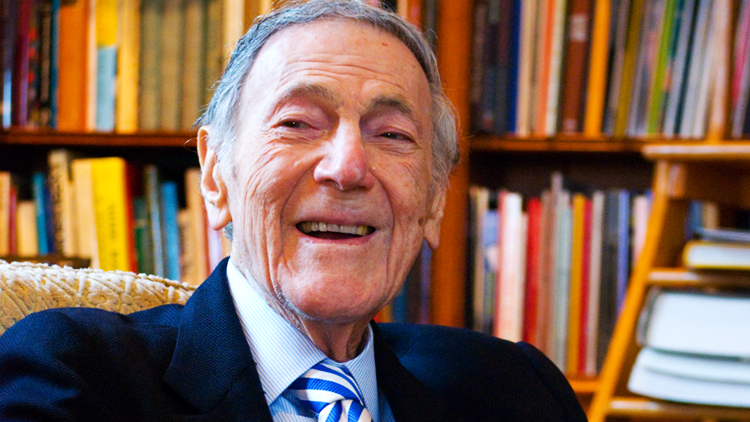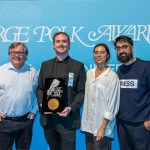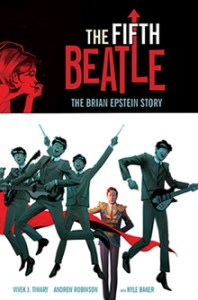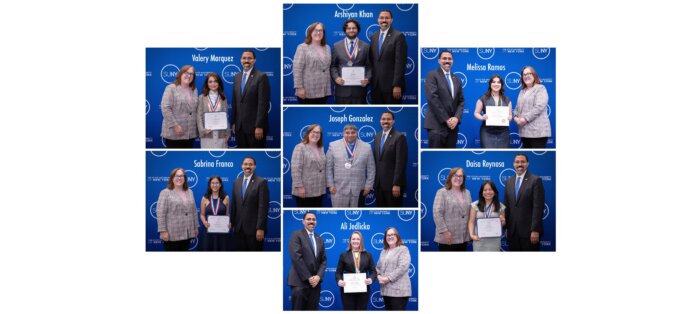On a rainy day in Sands Point, Arnold Saltzman—the 96-year-old former roving ambassador, esteemed art collector, successful businessman and generous benefactor— was discussing the weakness of American government, the savagery of German expressionism and the pleasure of his favorite poetry. He was sitting in his spacious study that publishing magnate Max Schuster had built in the 1920s and lined with book shelves. Saltzman and his wife Joan bought the property almost 40 years ago, kept Schuster’s library but razed the rest and redesigned their new house around it.
Gazing at the Sound, its horizon hidden in mist, Saltzman heard his wife talking in the kitchen with their housekeeper and his eyes sparkled.
“I can look at my wife’s face every day and smile,” he says. They just celebrated their 75th anniversary. Their courtship had lasted three months. Now they have three children and five grandkids.
Saltzman sat a little stiffly that morning because he’d hurt his back in a recent fall. “Most of my parts don’t work very well,” he says and draws his hand to his chin. “But this part works perfectly,” he adds, with a nod. “I remember everything! And I can still think strategically, which is a great comfort.”
Saltzman’s father had left Russia for America when he was five and settled in Brooklyn, where Arnold was born in 1916. Saltzman’s elementary school had 48 kids in one classroom. After graduating from Columbia University when he was 20, he went to work for the Roosevelt administration during the Depression and later enlisted in the Navy.
Over the years Joan and Arnold Saltzman have both left their mark on our region. Their names are on a new reading room at the Port Washington library, the Joan and Arnold Saltzman Community Services Center at Hofstra, where he’s trustee emeritus, and the Arnold and Joan Saltzman Fine Arts Building at the Nassau County Museum, where he was the founding president, and recently showed some Marc Chagall paintings from his private collection for an exhibit. Perhaps most fitting, considering that Saltzman served five U.S. presidents as an envoy on diplomatic missions, his moniker adorns the Arnold A. Saltzman Institute of War and Peace Studies at Columbia.
“Anything that can fight war and promote peace I’m for!” says Saltzman, a lifelong Democrat, who still believes that Hubert Humphrey “was the greatest American of our century…If he had succeeded, we would have had a much better country!”
President Richard Nixon, Saltzman says with a wry smile, wanted “no part” of him because he’d opposed the Vietnam War. “I’d been a pain in the neck to him,” Saltzman says.
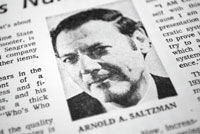 For his work as an envoy for President Johnson, he helped negotiate the Nuclear Non-proliferation Treaty in the 1960s, which may not get the attention it deserves today considering the smoldering conflicts around the globe but it’s an achievement still worth taking note of, as George Perkovich, director of the nuclear policy program at the Carnegie Endowment for International Peace in Washington, D.C., tells the Press, it is “a great success in humankind’s history of seeking to use law to constrain instruments of destruction… The treaty enjoys nearly universal adherence,” adds Perkovich, noting that only Israel, India, Pakistan, and now, North Korea are the exceptions. “The treaty has encouraged many states that otherwise had the capability to acquire nuclear weapons to forbear from doing so. It has facilitated the peaceful use of nuclear energy around the world. Few international agreements have done so much.”
For his work as an envoy for President Johnson, he helped negotiate the Nuclear Non-proliferation Treaty in the 1960s, which may not get the attention it deserves today considering the smoldering conflicts around the globe but it’s an achievement still worth taking note of, as George Perkovich, director of the nuclear policy program at the Carnegie Endowment for International Peace in Washington, D.C., tells the Press, it is “a great success in humankind’s history of seeking to use law to constrain instruments of destruction… The treaty enjoys nearly universal adherence,” adds Perkovich, noting that only Israel, India, Pakistan, and now, North Korea are the exceptions. “The treaty has encouraged many states that otherwise had the capability to acquire nuclear weapons to forbear from doing so. It has facilitated the peaceful use of nuclear energy around the world. Few international agreements have done so much.”
Saltzman says that the Cold War was a much simpler time than the war on terrorism, because the “mutual deterrence” between the America and the Soviet Union kept both sides from using their nuclear weapons. “There is no such thing now,” he says with regret.
But having played a hand in postponing Armageddon might be enough for most people to rest on their laurels, but not Saltzman.
In 1992, when he was only 76, he began helping Kyrgyzstan, a small impoverished former Soviet republic in Asia, turn its mineral resources into wealth because it had given his privately held company, Windsor Production Corporation, which still has an office in Manhattan that he regularly visits, the negotiating rights. Saltzman was “familiar with the region,” the New York Times reported, and the prospect excited him he said, because “it’s better than taking a vacation.”
Over the years Saltzman has spoken all over the country. After he’d gone to a Michigan church in 1971 and addressed the congregation for two hours, without notes, on the topic, “What is rich?,” the pastor sent him a thank-you note: “You have made me rethink what in fact it does mean to be rich and to know that even in one’s seeming poverty one is rich beyond words.”
You could say the same thing about Saltzman today. May his example inspire others for years to come.



